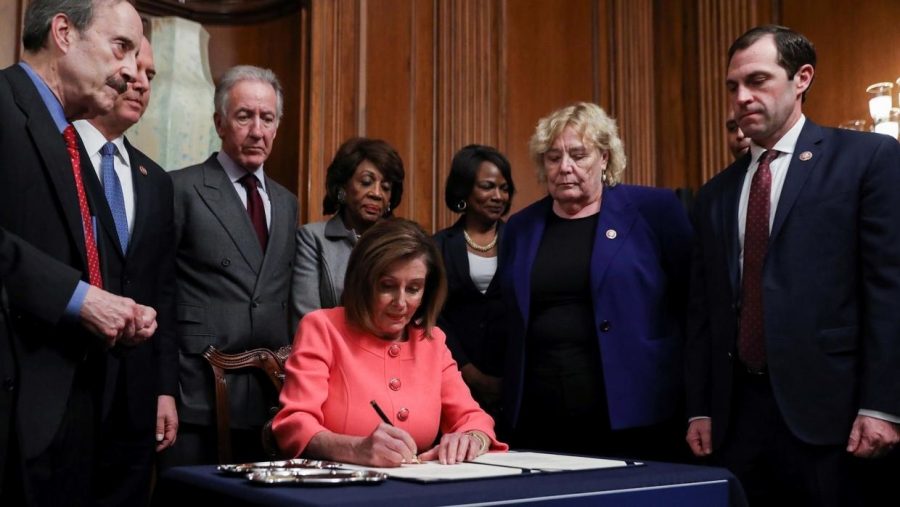Impeachment Articles Signed, Managers Selected
House Speaker Nancy Pelosi signs the articles of impeachment using a set of commemorative pens with her signature inscribed onto them.
January 17, 2020
On Wednesday, the US House of Representatives delivered the signed articles of impeachment against President Trump to the Senate. Two articles enumerate the charges the president faces. Article I addressed Abuse of Power, and passed 230-197, with 1 present. Article II, concerning Obstruction of Congress passed 229-198, with 1 present. Both present votes were cast by Hawaii Representative Tulsi Gabbard, who later stated on Twitter, “I came to the conclusion that I could not in good conscience vote either yes or no.”
House Speaker Nancy Pelosi held a signing ceremony mere hours after the House passed another resolution to transmit the articles, as well as appoint the House Managers, the team responsible for acting as prosecutors, presenting the case for removal to the Senate. Among the elite team of seven lawmakers chosen, House Intelligence Committee Chairman Adam Schiff (D-CA) will be at the lead. The rest of the managers chosen are distinguished for their litigation experience, and include Judiciary Chariman Jerrold Nadler (D-NY), Hakeem Jeffries (D-NY), Val Demmings (D-FL), Jason Crow (D-CO), Sylvia Garcia (D-TX), and Zoe Lofgren (D-CA).
The case the prosecutors intend on making revolves around an alleged quid pro quo, in which Trump attempted to use the influence of his office to direct a foreign ally to open an investigation into Joe Biden, a political opponent whose prospects in 2020 seem to grow brighter as this situation drags on. In addition, the managers will also present evidence of his administration’s attempt to stonewall congressional investigation into the alleged backroom dealing, which include issuing a directive ordering administration officials not to comply with congressional supboenas requesting their testimony.
The next step is for the Senate to begin the trial. It may be tempting to regard Trump’s acquital by the Republican-controlled Senate as a foregone conclusion, but this is not set in stone. The possibility of new evidence emerging, as well as testimony damaging to the president are not to be underestimated. Already, Lev Parnas, an associate of the president’s personal attorney Rudy Guliani has thrown the impeachment debate into chaos by providing troves of evidence in relation to Guliani’s efforts to get former Ukranian Ambassador Marie Yovanovitch fired. Another narrative he has provided key information to is related to pressure put on Ukraine to investigate former Vice President Joe Biden and his son.
The possibility of this evidence or testimony damaging the president is mitigated by Mitch McConnell’s crusade to keep them out of the trial entirely. He argues that by rushing their inquiry, House Democrats failed to adequately consider their case for impeachment, and therefore have no basis to essentially relaunch the investigation in the Upper House. He maintains that witnesses and new documents should be kept out of the trial entirely. But not all senators agree. Every Democrat in the Senate has expressed interest in opening the trial to witnesses, and Republican senators are beginning to cross party lines in agreement. Susan Collins (R-ME) has informed the media that she is working with a group of GOP senators to make sure witnesses such as Bolton are called.
It turns out that even this may not be enough to gather the necessary evidence for the trial to proceed. When asked about the possibility of Bolton’s testimony, the President alluded to asserting executive privilege to prevent him from doing so. All of this petty fighting over rules raises the question: if the impeachment really is a “hoax”, as the president insists, why does the he feel compelled to prevent his associates from testifying? Right now, virtually the only thing that seems certain is that the upcoming Senate trial will be a long, dramatic battle carried out on the public stage.


